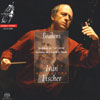Brahms Symphony No 1; Haydn (St Antony) Variations
An East European view of Brahms that is vibrant, stylish and alert
View record and artist detailsRecord and Artist Details
Composer or Director: Johannes Brahms, Iván Fischer
Genre:
Orchestral
Label: Channel Classics
Magazine Review Date: 12/2009
Media Format: Hybrid SACD
Media Runtime: 0
Mastering:
Stereo
DDD
Catalogue Number: CCSSA28309

Tracks:
| Composition | Artist Credit |
|---|---|
| (21) Hungarian Dances, Movement: D minor (orch Parlow) |
Johannes Brahms, Composer
Budapest Festival Orchestra Iván Fischer, Composer Johannes Brahms, Composer |
| Variations on a Theme by Haydn, 'St Antoni Chorale |
Johannes Brahms, Composer
Budapest Festival Orchestra Iván Fischer, Composer Johannes Brahms, Composer |
| Symphony No. 1 |
Johannes Brahms, Composer
Budapest Festival Orchestra Iván Fischer, Composer Johannes Brahms, Composer |
Author: Richard Osborne
Fischer and his decidedly classy Budapest orchestra treat the Variations as an affectionate tribute to Haydn, an east-of-Vienna man if ever there was one. Finely sprung and nicely styled, the performance even has its own zigeunerisch dimension – in the finale where Brahms’s witty and heroic use of the triangle is neatly pointed. A superlative recording helps. As with Decca in Geneva in the 1950s and later in Montreal, Channel Classics is on to a winner here with this orchestra and this hall, Budapest’s Palace of Arts.
And what of the symphony, which Fischer describes with Polonius-like elaboration as Brahms’s first “German Hungarian Gypsy Swiss Austrian symphony”? This too is a vibrant affair, stylish and alert, played with a clarity and sheen (and the merest hint of string portamento) in a manner Nikisch himself might have recognised.
Fischer brings out the dance element in the first-movement Allegro, the music’s youthful purpose. After a slow movement exquisitely voiced on the orchestra, the third movement has a pace and grace that again seems decidedly Hungarian. Fisher is comprehensively floored by the weirdly fluctuating pizzicato transition near the start of the finale but poise and momentum are soon restored. The symphony’s peroration is more than usually fiery.
This is a more extrovert reading than many you will hear, less burdened. Conscious of this, and perhaps wanting to have the best of both worlds, Fischer plays the lyric sections of the first movement rather broadly and begins drawing down the coda a whole 20 bars before the brief 15-bar meno allegro Brahms asks for. Furtwängler did something similar but subtly and disarmingly. Since Fischer’s command of a subtly fluctuating pulse is not in the Furtwängler league, the effect seems manufactured. Better conduct your own Brahms well than someone else’s badly. Happily, for most of the performance Fischer does just that.
Discover the world's largest classical music catalogue with Presto Music.

Gramophone Digital Club
- Digital Edition
- Digital Archive
- Reviews Database
- Full website access
From £8.75 / month
Subscribe
Gramophone Full Club
- Print Edition
- Digital Edition
- Digital Archive
- Reviews Database
- Full website access
From £11.00 / month
Subscribe
If you are a library, university or other organisation that would be interested in an institutional subscription to Gramophone please click here for further information.




